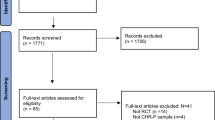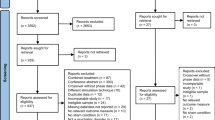Abstract
We report findings from a 12-week randomized double-blinded placebo-controlled trial of methylphenidate or galantamine to treat emotional and cognitive complaints in individuals (n=32) with a history of PTSD, TBI, or both conditions. In this small pilot study, methylphenidate treatment was associated with clinically meaningful and statistically significant improvement compared with placebo on the primary outcome, a measure of cognitive complaints (Ruff Neurobehavioral Inventory—Postmorbid Cognitive Scale), as well as on the secondary outcomes reflecting post-concussive (Rivermead Post Concussive Symptom Questionnaire) and post-traumatic stress symptoms (Posttraumatic Stress Disorder Checklist). Treatment was well tolerated. These results suggest the need for a larger RCT to replicate and confirm these findings. Design considerations for such a trial should include the need for multiple sites to facilitate adequate recruitment and extension of the treatment and follow-up periods.
Similar content being viewed by others
Log in or create a free account to read this content
Gain free access to this article, as well as selected content from this journal and more on nature.com
or
References
Abraham AD, Cunningham CL, Lattal KM (2012). Methylphenidate enhances extinction of contextual fear. Learn Mem 19: 67–72.
Advokat C (2010). What are the cognitive effects of stimulant medications? Emphasis on adults with attention-deficit/hyperactivity disorder (ADHD). Neurosci Biobehav Rev 34: 1256–1266.
Aga-Mizrachi S, Cymerblit-Sabba A, Gurman O, Balan A, Shwam G, Deshe R et al (2014). Methylphenidate and desipramine combined treatment improves PTSD symptomatology in a rat model. Transl Psychiatry 4: e447.
Arciniegas D, McAllister T, Kaufer D (2007). Cognitive Impairment. In: Coffey CE, McAllister TW, Silver JM (eds). Guide to Neuropsychiatric Therapeutics, Lippincott Williams & Wilkins: Philadelphia, PA, USA, pp 24–78.
Arciniegas DB, Silver JM (2006). Pharmacotherapy of posttraumatic cognitive impairments. Behav Neurol 17: 25–42.
Brady KT, Killeen TK, Brewerton T, Lucerini S (2000). Comorbidity of psychiatric disorders and posttraumatic stress disorder. J Clin Psychiatry 61: 22–32.
Brewin CR, Kleiner JS, Vasterling JJ, Field AP (2007). Memory for emotionally neutral information in posttraumatic stress disorder: a meta-analytic investigation. J Abnorm Psychol 116: 448–463.
Bryan CJ, Clemans TA (2013). Repetitive traumatic brain injury, psychological symptoms, and suicide risk in a clinical sample of deployed military personnel. JAMA Psychiatry 70: 686–691.
Bryan CJ, Clemans TA, Hernandez AM, Rudd MD (2013). Loss of consciousness, depression, posttraumatic stress disorder, and suicide risk among deployed military personnel with mild traumatic brain injury. J Head Trauma Rehabil 28: 13–20.
Carlson KF, Kehle SM, Meis LA, Greer N, Macdonald R, Rutks I et al (2011). Prevalence, assessment, and treatment of mild traumatic brain injury and posttraumatic stress disorder: a systematic review of the evidence. J Head Trauma Rehabil 26: 103–115.
Chew E, Zafonte RD (2009). Pharmacological management of neurobehavioral disorders following traumatic brain injury–a state-of-the-art review. J Rehabil Res Dev 46: 851–879.
Dawson DA, Grant BF, Stinson FS (2005). The AUDIT-C: screening for alcohol use disorders and risk drinking in the presence of other psychiatric disorders. Compr Psychiatry 46: 405–416.
Falconer E, Bryant R, Felmingham KL, Kemp AH, Gordon E, Peduto A et al (2008). The neural networks of inhibitory control in posttraumatic stress disorder. J Psychiatry Neurosci 33: 413–422.
Hankin CS, Spiro A, Miller DR, Kazis L (1999). Mental disorders and mental health treatment among US Department of Veterans Affairs outpatients: the Veterans Health Study. Am J Psychiatry 156: 1924–1930.
Hart T, Benn EK, Bagiella E, Arenth P, Dikmen S, Hesdorffer DC et al (2014). Early trajectory of psychiatric symptoms after traumatic brain injury: relationship to patient and injury characteristics. J Neurotrauma 31: 610–617.
Hoge CW, McGurk D, Thomas JL, Cox AL, Engel CC, Castro CA (2008). Mild traumatic brain injury in U.S. Soldiers returning from Iraq. N Engl J Med 358: 453–463.
Howlett JR, Stein MB (2015). Novel prevention and treatment approaches to PTSD. In: Liberzon I and Ressler KJ (eds). Neurobiology of PTSD. Oxford University Press: Oxford, UK.
Jorge RE, Robinson RG, Moser D, Tateno A, Crespo-Facorro B, Arndt S (2004). Major depression following traumatic brain injury. Arch Gen Psychiatry 61: 42–50.
Koontz J, Baskys A (2005). Effects of galantamine on working memory and global functioning in patients with mild cognitive impairment: a double-blind placebo-controlled study. Am J Alzheimers Dis Other Demen 20: 295–302.
Kroenke K, Spitzer RL, Williams JB (2001). The PHQ-9: validity of a brief depression severity measure. J Gen Intern Med 16: 606–613.
Loy C, Schneider L (2006). Galantamine for Alzheimer’s disease and mild cognitive impairment. Cochrane Database Syst Rev CD001747 (doi:10.1002/14651858.CD001747.pub3).
McAllister TW, Arciniegas D (2002). Evaluation and treatment of postconcussive symptoms. NeuroRehabilitation 17: 265–283.
McAllister TW, Stein MB (2010). Effects of psychological and biomechanical trauma on brain and behavior. Ann N Y Acad Sci 1208: 46–57.
McMahon P, Hricik A, Yue JK, Puccio AM, Inoue T, Lingsma HF et al (2014). Symptomatology and functional outcome in mild traumatic brain injury: results from the prospective TRACK-TBI study. J Neurotrauma 31: 26–33.
MTA Working Group (1999). A 14-month randomized clinical trial of treatment strategies for attention-deficit/hyperactivity disorder. The MTA Cooperative Group. Multimodal Treatment Study of Children with ADHD. Arch Gen Psychiatry 56: 1073–1086.
Neurobehavioral Guidelines Working Group, Warden DL, Gordon B, McAllister TW, Silver JM, Barth JT et al (2006). Guidelines for the pharmacologic treatment of neurobehavioral sequelae of traumatic brain injury. J Neurotrauma 23: 1468–1501.
Parker G, Brotchie H, McClure G, Fletcher K (2013). Psychostimulants for managing unipolar and bipolar treatment-resistant melancholic depression: a medium-term evaluation of cost benefits. J Affect Disord 151: 360–364.
Ruff RM, Hibbard KM (2003) RNBI, Ruff Neurobehavioral Inventory: Professional Manual. Psychological Assessment Resources: Lutz, FL, USA.
Schilstrom B, Ivanov VB, Wiker C et al (2007). Galantamine enhances dopaminergic neurotransmission in vivo via allosteric potentiation of nicotinic acetylcholine receptors. Neuropsychopharmacology 32: 43–53.
Schneiderman AI, Braver ER, Kang HK (2008). Understanding sequelae of injury mechanisms and mild traumatic brain injury incurred during the conflicts in Iraq and Afghanistan: persistent postconcussive symptoms and posttraumatic stress disorder. Am J Epidemiol 167: 1446–1452.
Seeman P, Madras BK (1998). Anti-hyperactivity medication: methylphenidate and amphetamine. Mol Psychiatry 3: 386–396.
Silver JM, Koumaras B, Chen M, Mirski D, Potkin SG, Reyes P et al (2006). Effects of rivastigmine on cognitive function in patients with traumatic brain injury. Neurology 67: 748–755.
Silver JM, McAllister TW, Arciniegas DB (2009). Depression and cognitive complaints following mild traumatic brain injury. Am J Psychiatry 166: 653–661.
Stein MB, McAllister TW (2009). Exploring the convergence of posttraumatic stress disorder and mild traumatic brain injury. Am J Psychiatry 166: 768–776.
Tanev KS, Pentel KZ, Kredlow MA, Charney ME (2014). PTSD and TBI co-morbidity: Scope, clinical presentation and treatment options. Brain Inj 28: 261–270.
Tenovuo O (2005). Central acetylcholinesterase inhibitors in the treatment of chronic traumatic brain injury-clinical experience in 111 patients. Prog Neuropsychopharmacol Biol Psychiatry 29: 61–67.
Thompson S, Lanctot K, Herrmann N (2004). The benefits and risks associated with cholinesterase inhibitor therapy in Alzheimer’s disease. Expert Opin Drug Saf 3: 425–440.
Vasterling JJ, Brailey K (2005). Neuropsychological findings in adults with PTSD. In: Vasterling JJ, Brewin CR (eds). Neuropsychology of PTSD: Biological, Cognitive, and Clinical Perspectives. Guilford Press: New York, NY, USA, pp 178–207.
Wilcock GK, Lilienfeld S, Gaens E (2000). Efficacy and safety of galantamine in patients with mild to moderate Alzheimer's disease: multicentre randomised controlled trial. BMJ 321: 1445–1449.
Wilk JE, Herrell RK, Wynn GH, Riviere LA, Hoge CW (2012). Mild traumatic brain injury (concussion), posttraumatic stress disorder, and depression in U.S. soldiers involved in combat deployments: association with postdeployment symptoms. Psychosom Med 74: 249–257.
Willmott C, Ponsford J (2009). Efficacy of methylphenidate in the rehabilitation of attention following traumatic brain injury: a randomised, crossover, double blind, placebo controlled inpatient trial. J Neurol Neurosurg Psychiatry 80: 552–557.
Wisco BE, Marx BP, Holowka DW, Vasterling JJ, Han SC, Chen MS et al (2014). Traumatic brain injury, PTSD, and current suicidal ideation among Iraq and Afghanistan U.S. veterans. J Trauma Stress 27: 244–248.
Yurgil KA, Barkauskas DA, Vasterling JJ, Nievergelt CM, Larson GE, Schork NJ et al (2014). Association between traumatic brain injury and risk of posttraumatic stress disorder in active-duty marines. JAMA Psychiatry 71: 149–157.
Acknowledgements
We acknowledge Laura Burns, Leigh Chesnut, Judith Frazier, Mary Hynes, and Michael Macklin, for their contributions to this work. We are also grateful to the members of the Data Safety Monitoring Board, chaired by Gerald van Belle, PhD, for their careful oversight of the study.
Author information
Authors and Affiliations
Corresponding author
PowerPoint slides
Rights and permissions
About this article
Cite this article
McAllister, T., Zafonte, R., Jain, S. et al. Randomized Placebo-Controlled Trial of Methylphenidate or Galantamine for Persistent Emotional and Cognitive Symptoms Associated with PTSD and/or Traumatic Brain Injury. Neuropsychopharmacol 41, 1191–1198 (2016). https://doi.org/10.1038/npp.2015.282
Received:
Revised:
Accepted:
Published:
Issue date:
DOI: https://doi.org/10.1038/npp.2015.282
This article is cited by
-
Burning down the house: reinventing drug discovery in psychiatry for the development of targeted therapies
Molecular Psychiatry (2023)
-
Single doses of a highly selective inhibitor of phosphodiesterase 1 (lenrispodun) in healthy volunteers: a randomized pharmaco-fMRI clinical trial
Neuropsychopharmacology (2022)
-
An epigenome-wide association study of posttraumatic stress disorder in US veterans implicates several new DNA methylation loci
Clinical Epigenetics (2020)
-
Cognition based bTBI mechanistic criteria; a tool for preventive and therapeutic innovations
Scientific Reports (2018)
-
Untangling PTSD and TBI: Challenges and Strategies in Clinical Care and Research
Current Neurology and Neuroscience Reports (2018)



